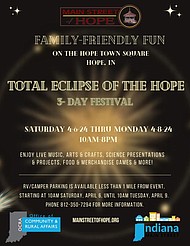January 2, 2024 at 10:35 a.m.
In my thirteen years of writing articles for the Hope area, I have written several about movies and books. Recently, I received a book from one of my daughters for my birthday, "The In-Between" by Hadley Vlahos, RN.
While in Florida for a vacation, I made reading the best-selling book a priority and admittedly cried with each chapter as Hadley shares her personal life mixed in with being a Hospice nurse. Hadley has over a million followers on social media, and I can understand why after reading her very personable book.
The story in Chapter Ten particularly made an impression. Hadley was asked to serve a homeless patient, Albert, under the East Creek Bridge in Florida, one of her sixteen patients at that time. As she approached his tent, Hadley notice a sign, SPREAD LOVE NOT HATE, which I'm sure added a little comfort. Albert was in much pain due to unmanaged diabetes and an infected foot. He refused to enter the hospital for care. When striving to find Medicaid for Albert, they needed some information which he responded, “Honey, I don't have a driver's license or a bank account. I don't have a penny to my name.”
Hadley returned several times. Soon, she received a call from one of Albert's friends, Gil, and quickly made her way to the camp. She stated the following: “I found a beautiful sight. All the people I had come to recognize, who lived with Mr. Al, were gathered around him, praying hand in hand. They parted to let me in, smiling at me politely, their faces streaked with tears.”
The ending of the story in Chapter Six about Edith, a patient with Alzheimer's, certainly aroused my interest. Hadley received a frantic call from Edith's husband, John, in the middle of the night. When arriving, Hadley found both Edith and John in their bedroom. Edith was pacing back and forth shouting “Fire” repeatedly. Numerous attempts were tried to help Edith settle down, all unsuccessful. Hadley called a veteran nurse that suggested they move the bed to another room. They did, and Edith settled down immediately. Eventually, the decision was to move her to a care facility where Edith spent her last days, seemingly never having anxiety again. She could only say one word at the end due to the progress of the disease, “John,” until one day, unexpectedly, she said “Hadley.” After Edith's death, there was a special tribute ceremony for her at the facility. John approached Hadley wishing to share something of importance. Following you will find their conversation:
“Do you remember when Edith thought the bedroom was on fire?”
“Of course. I'll never forget.”
“Well, they aren't really sure what happened, possibly an electrical fire, but that bedroom caught on fire one night a few months after Edith died.”
“Are you okay?”
“Yes, but only because I never moved the bed back. I've been sleeping in that extra bedroom ever since you moved the bed. … Edith knew.”
Hadley made a statement when reflecting about her experiences that really struck me because I quickly recognized the importance of it in education: “I have learned how important it is to be a human first and an employee second.”
Hospice was there for my dad and is there for my Mom as I write this article. My Dad wished to have his final days at home and so are the wishes of my Mom. Through the great care of Hospice nurses and my two sisters, we were able to follow through with Dad and hope to do the same for Mom. I am well aware of times families very much want the situation for their loved ones, but circumstances prevent it. It has happened in our family.
Earthly death of a loved one is something we must all wade through as well as our death. I am glad I read this book and think it is a must read for all.


